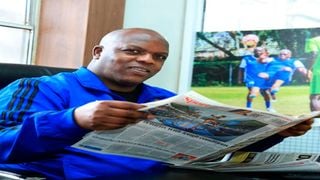
Elias Makori, Managing Editor, Sports, at the Nation Media Group.
| Jeff Angote | Nation Media GroupLifestyle
Premium
Elias Makori: A lifetime of sports journalism
What you need to know:
- Elias Makori has shared the stage, sometimes in exclusive setups, with stars such as Lebron James, Serena Williams and Kobe Bryant.
- It’s hard to choose his most memorable sporting event. But the World Cup in South Africa in 2010 features high up the list.
Every newsroom has boisterous journalists and ostentatious ones. Elias Makori is neither of these. The Sports managing editor at the Nation Media Group is nearly as quiet as he is stealthy.
Makori paces the newsroom with an unassuming cool, only occasionally stopping to greet colleagues. If being inconspicuous is an art, the veteran journalist and editor has this one down pat.
It’s easy to pass him on the streets. Except his is a lofty perch in the global sports arena. For starters, Makori has travelled the world covering major sporting showpieces, from the Olympics, World Cup and World Championships among others.
To step into his office at Nation Centre is like to tour a section of a sports museum — a basketball hanging by the window, the ‘‘Gilbert’’ (rugby ball) sitting nearby, the Brazilian flag decorating another wall, trophies on every surface and a collection of other sports memorabilia and merchandise in Kenyan colours.
This journalist is a scarce figure in the newsroom. When I finally get a hold of him for this interview, he’s in between meetings and Covid-19 clearances, with a flight to Tokyo only hours away. Such has been his life for 30 years.
Three decades, though, is a long time to do the same thing with such startling consistency. Doesn’t he experience the ennui of routine?
Not at all, he insists with eagerness. "Sports is special. New stars and fresh talent keep coming up and growing. This re-energises me because there’s always something to look forward to — the next big star and the next big match."
Jamaican sprinter Usain Bolt and Kenyan marathoner Eliud Kipchoge easily come to mind.
"I followed Bolt from when he was running in the junior championships in Jamaica through his global superstardom until he retired. When you are following the career of an athlete, you don’t perceive the passage of time," says Makori.
Such a career as his is replete with honours. But foremost, rare interactions. Makori has shared the stage, sometimes in exclusive setups, with stars such as Lebron James, Serena Williams and Kobe Bryant. He has some of the top personalities on the sporting scene on speed dial.
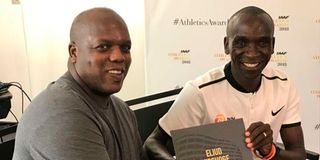
World marathon record holder Eliud Kipchoge hands over the first copy of a special book in honour of his world record to Nation Media Group's Managing Editor, Sports, Elias Makori at the Le Meridien Hotel in Monaco on December 4, 2018.
I’m curious to know if any of them has had an impression on him. Many have, but Kipchoge leads the pack.
"By emerging, winning several titles in junior championships as an 18-year-old and going ahead to break the world marathon record, Kipchoge has transformed how we look at sports."
Makori and the marathon legend have had fights, he admits, the most defining one being after Kipchoge had won his first major marathon in Chicago in 2013. The dispute arose from Kipchoge’s disinclination to engage the media. Makori was vexed.
“I gave him a piece of my mind. I told him 'the media can build you or destroy you’. Thankfully, he took it well. Today, we laugh about it. We have mutual respect. He gave me the first copy of his book No Human is Limited.’’
When Kipchoge crossed the finish line at 1:59:40 at Prater Park during the Ineos 1:59 Challenge that cold morning in October 2019, Makori was in Vienna to witness history being made. That it was “special” is his summation of one of the most sensational moments in sports history.
Recently, Kipchoge was at Nation Centre on Makori’s invitation to talk to the advertising team.
Bolt too inspires him ‘‘because of his work ethic and discipline’’ besides their shared support for Manchester United. Makori was involved in the Jamaican’s 2008 trip to Kenya. Bolt adopted a cheetah.
“We would meet at the media area during championships and chat. He taught me that it’s fair to work hard and to party equally hard. I’ve been to a few parties with him and he doesn’t hold back.’’
After postponement for 15 months, the Tokyo Olympics will finally start in two weeks. Makori doesn’t think there’s much to witness this time, owing to Covid-19 caps.
“Spectators aren’t allowed. Participants aren’t allowed to use public transport. I like to use public transport to mingle with people, to listen to their music and to blend with their culture whenever I’m outside the country. All these have been taken away. It will be a boring edition of the Olympics.”
Out-of-the-norm incidents might be the only chance for euphoria.
“It will be difficult to put everyone on the straight and narrow. I love disruptions. So it will be interesting to see who breaks the rules.”

Elias Makori receives the 2012 IAAF World Journalist of the Year award from the then chairman of the 2012 London Olympic Games, Sebastian Coe (now the President of World Athletics) at Skipper Pullman Hotel in Barcelona on November 24, 2012.
This time, Makori will travel not as a reporter, but as Team Kenya media liaison officer “to help the athletes with media engagements” a role he says he’s upbeat about.
It’s hard to choose his most memorable sporting event. But the World Cup in South Africa in 2010 features high up the list: ‘‘It was an African thing. It’s here that I met Diego Maradona, then Argentina coach. Sharing a platform with the legend was special.”
But it’s during the 2008 Beijing Olympics where Kenya’s Samuel Wanjiru won gold in Marathon that’s most emotional to him. Talking about it transports him back to that moment 13 years ago.
“I had sat with him and his coach the day before, talking about his running tactics. His coach gave splits for every kilometre. I did a story for the Nation: “How Wanjiru hopes to win the marathon today.”
Sitting in the stadium and watching him on the screen, comparing my notes with what was actually happening on the course was exhilarating.”
After 35 kilometres, Makori had no doubts that his fellow countryman was on the cusp of history.
“I positioned myself in the Olympic Stadium to witness that moment when he would perform the lap of honour, celebrating Kenya’s first gold in Olympics marathon.”
Wanjiru’s tragic death in 2011 hit Makori hard. ‘
‘It took me a long time to recover because I had shared a lot with him during his brief career.’’
Private life
A great deal is known about Makori in the sports arena. Hardly much about his private life. He is a family man, a father and a husband. Makori says he married “past the Kenyan standard of 20s”. He was 43.
“My wife is called Christine. She is a marketer and businesswoman. Heri, our son, is six,’’ explains Makori, adding that fatherhood has taught him about calmness.
When I ask him to talk about his father, Gesora Obanyi, whom he lost last month, Makori winces.
Shifting in his chair, he says: ‘‘I don’t think I’ve mourned him enough.’’
He seems lost again. After several moments of silence, he continues: "I’ve been too distracted to mourn. Maybe I’m experiencing delayed grief."
Soon after burying his father, the Safari Rally started, where he was in charge of media relations.
Already, the Olympics was beckoning. The event starts on July 23.
"I’m learning to distract myself and to switch off. I know it will hit me at some point. It’s (grief) a part of life that we somehow have to deal with."
His dad’s memories are plenty.
"He endorsed my career at a time when journalism was a dangerous profession in Kenya. Having played football as a college student in the UK, he was excited when I switched to sports journalism. We spoke a lot about football and Manchester United, our favourite team.”
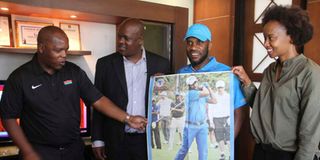
Elias Makori explains a point to former international Nigeria football star Augustine Okocha (JayJay Okocha) while displaying the player's poster with then Nation Media Group CEO Joe Muganda (second left) and Caroline Ndung'u Marketing and Corporate Relation Director Barclays Bank of Kenya (right) looking when the Nigerian legend paid a courtesy call at Nation Centre on March 24, 2017
After such a long career, Makori admits that there have been low moments, instances of putting out fires and "premature" collapse of dreams.
"Fighting to get sports respected against the political inclination of our journalism hasn’t been easy. Looking back, I think perhaps I should have fought harder.”
Sports journalism, he adds, isn’t about money but passion.
"If I was following money like some of my peers have, I’d probably be elsewhere."
He says his experiences have been exciting, nonetheless, including a “career detour” when he took up the post of head of the Nation bureau in Eldoret.
But if he were to leave the newsroom today, Makori says he would take with him good memories, experience and, of course, a paycheck.
“I’m collecting all my articles from 1991 when I joined the Standard newspaper. I’d like to keep an archive of these works to document my journey, the places I’ve been, the things I did and where I could have done better. These materials will come in handy as I get into mentorship of future journalists.”
Kenya may be an athletics powerhouse, but two decades ago, the quality of coverage, especially from local journalists, was underwhelming, he recalls.
“I wanted to report about our rich young athletics talent. Our athletes from the North Rift, for instance, don’t talk much. As such, their story wasn’t always told sufficiently. Someone had to go down there, spend time with them, win their trust, build confidence in them and tell their stories.”
By taking up this challenge, Makori put himself on the path to being tapped by the world’s athletics body, International Association of Athletics Federations (IAAF), to join their media department to promote human-interest stories. He would go on to serve for 12 years until 2012.
Sports administration
Makori has juggled sports journalism and sports administration for most of his career in what he describes as a “delicate balancing act that needs discipline”.
What’s his magic? How does he ensure that his reporting is objective?
“I face issues head-on. I don’t sugarcoat things. I say them as they are, however uncomfortable they are. This has made me enemies in various places.’’
To do this, he has had to make tough choices too.
“It’s difficult to decline an opportunity to serve the country or sports in a different capacity after accumulating experience for many years as a journalist.’’
On his leadership style, Makori says he prefers a free, responsible and playful approach.
“I hate to micromanage people. Instead I allow them to be expressive, but within the confines of the rules of the game.’’
Besides writing on sports, Makori is proudest of discovering and linking Dennis Kimetto with a coach in Europe. Kimetto, a long-distance runner, continues to represent Kenya todate.
There is also former Harambee Stars skipper Musa Otieno, whom he supported to travel to South Africa to play for Santos.
“It’s only fair to use the networks and contacts I’ve built over the years to promote talent.”
In 2015 and 2016, Makori was at the Johan Cruyff Institute in Barcelona, Spain, studying for a Master’s in sports management.
“I learnt a lot about sports finance, financial discipline and sports contracts, things that journalists sometimes don’t look at critically. I also made valuable networks in Spain. One of my lecturers was later appointed a marketing executive for FC Barcelona.”
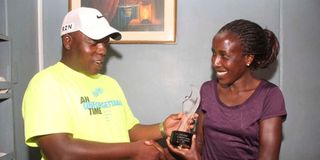
Kenyan-born Dutch athlete Lornah Kiplagat receives her Business Daily “Top 40 under 40” trophy from Elias Makori, Nation Media Group’s North Rift Region Editor, in Eldoret town on January 26, 2015.
Networks, he says, are priceless in journalism and particularly in sports.
“You’re practically out of the game without networks as a journalist. Networks will help you to access information that nobody else has and keep you ahead in the game.”
With most sporting activities suspended, fans and journalists locked out of stadia in the past year, many careers have gone up in smoke, he observes.
“Only people who had contacts survived. These could activate their contacts and get the story through phone calls.”
Thirty years later, a wealth of experience, global connections and a fortune. What is he working for at this point? Mentorship, he replies, his face lighting up. This subject fires him up.
"Sadly, sports journalism is still not highly regarded in Kenya. Institutions of higher learning that offer journalism don’t have courses in sports journalism. To change this, I’m spending my time mentoring and, through my contacts, giving the exposure to talent whenever I see it,” he says, revealing he will go into sports teaching when he hangs his boots.
What does he think about the current crop of young sports journalists in Kenya? Do they inspire pride in him? He calls it a mixed bag: immense promise on the one hand and a lot of work to do on the other.
“It pains me to read poorly researched articles and commentaries. A sports journalist should have their facts right when interviewing sports personalities and reporting on matches. Know the players. Understand team statistics. I would like to see more informed sports journalism.”
Journalists, he says, owe it to their audiences to research about athletes who will be competing in the Olympics, by utilising technology.
“Back in the day, we had to listen to radio a lot and read books and articles to know the players. With Google, today, it’s easier to get these facts.”
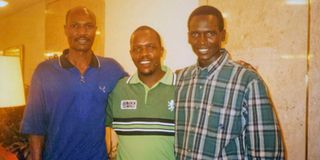
Elias Makori, the Managing Editor, Sports, at Nation Media Group, with Kenya's long-distance runner Paul Tergat (right) in this undated photo. Tergat is now the President of Kenya National Olympic Committee (Nock).
From Nyamira County to the World. Makori has visited nearly 100 countries on every continent throughout his career. Have these tours taught him anything about himself?
“Yes, that I’m no less a human being than anyone else,” he says with an explosion of glee.
“People are the same everywhere. We have the same successes and make the same mistakes. Travel builds your confidence. You realise you’re as good as an American or Japanese. I wish had the opportunity to travel when I was younger.”
Makori turns 50 this December. At this age, he says he finds his centre through spirituality.
“Kakamega Catholic Diocese Bishop Obanyi, who’s also my cousin, has mentored me a lot spiritually. I’ve followed his journey from when he was an altar boy, through his vicarage and now a bishop. He’s always my go-to person whenever I need guidance.”
Life is simpler than we take it to be, he says on the question of values. “I’ve interacted with wealthy people in my travels; people who live modestly. These interactions have taught me the importance of being less materialistic.”
Any material things that he holds dear? His awards, he says. “Winning the World Journalist of the Year award in 2012 in Barcelona was special. Before me, the award had been won mostly by veteran European journalists. Standing alongside Usain Bolt as the journalist of the year was humbling.”
The award is a lifetime achievement for his contribution to athletics journalistically. One also doesn’t enter a competition for the award, but is instead voted for. The priceless piece, preserved in a quaint navy blue casing, sits in his office “as a daily motivation in my work.”
Does he indulge? Only socially, he says. ‘‘I love my Tusker and brandy. I’m not a habitual drinker. Sometimes I drink once in two weeks.
His most memorable interactions abroad have been formed around pub engagements. During a tour of duty in Montevideo in Uruguay in 1998, Makori ordered the local beer, which comes in two-litre tubs. He downed it and asked for a second one.
"Everyone in the pub was staring at me. I thought the patrons were being racist. The barman later explained that the casks traditionally serve four people."
For Makori, work and recreation overlap. His is an ear for reggae, old school rock and bango, and especially, live bands. Unlike many his age, lingala doesn’t quite tug at his sentimental core.
“I love road trips. But besides motorsport, I’m not big on cars. But vintage cars fascinate me. Restoring old cars is something I’d want to do as a pastime.”
Has he considered a departure from sports? Makori says he wouldn’t survive a day. “Sports is what I want to do until I drop down. My desire is to continue nurturing sporting talent.”





